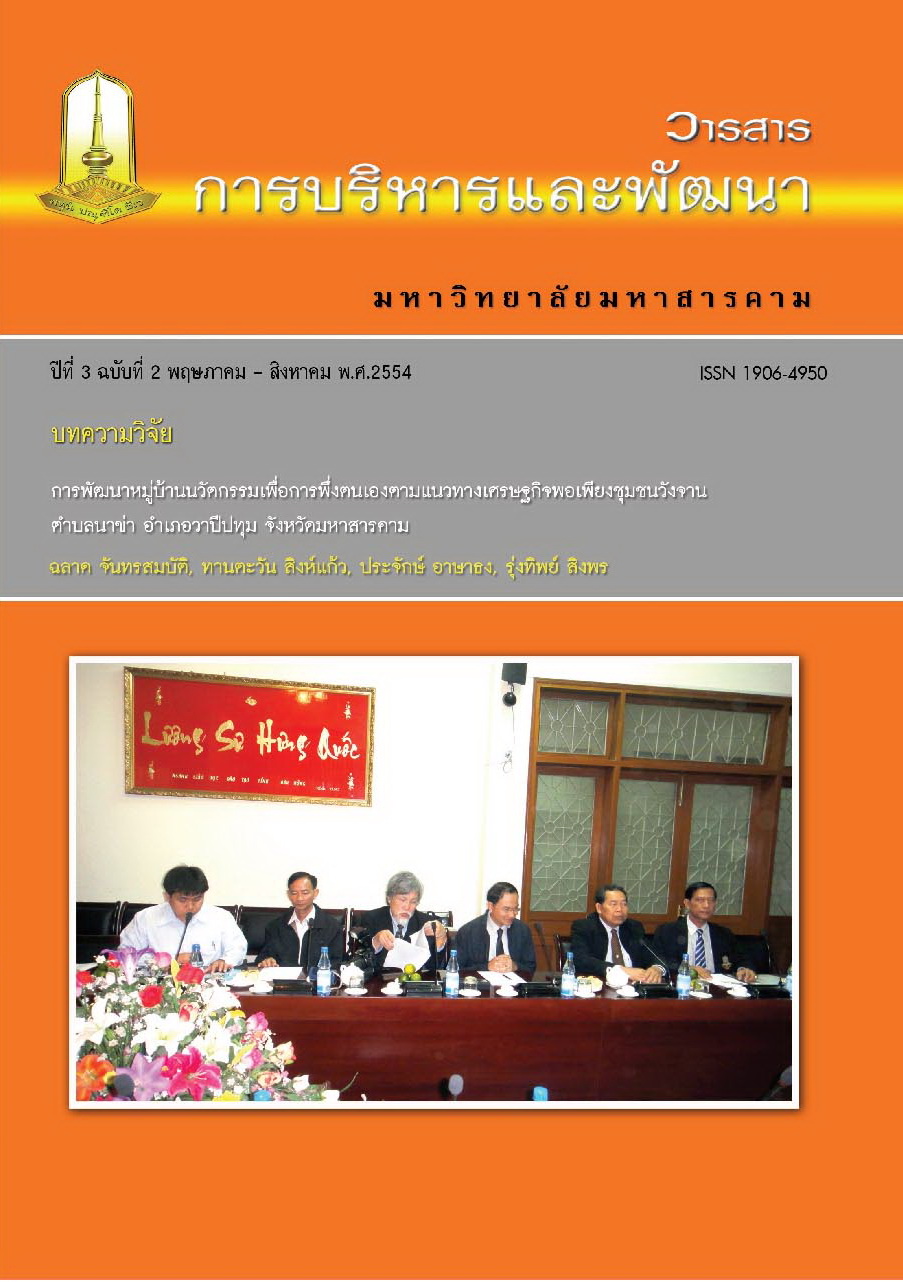รูปแบบการจัดการเทคโนโลยีสารสนเทศและการสื่อสารของโรงเรียนในฝัน จังหวัดกาฬสินธุ์
Main Article Content
Abstract
บทคัดย่อ
การวิจัยมีวัตถุประสงค์เพื่อ 1) ศึกษาสภาพปัจจุบัน ปัญหา และความต้องการการจัดการ การเทคโนโลยีสารสนเทศและการสื่อสารของโรงเรียนในฝัน จังหวัดกาฬสินธุ์ 2) พัฒนารูปแบบการ จัดการเทคโนโลยีสารสนเทศและการสื่อสารของโรงเรียนในฝันจัง หวัดกาฬสินธุ์ เป็นรูปแบการวิจัย ประยุกต์ (Applied Research) โดยใช้วิธีการวิจัยแบบผสมผสานระหว่างการวิจัยเชิงปริมาณและการวิจัยเชิงคุณภาพ การดำเนินการวิจัยแบ่งออกเป็น 2 ระยะ คือ ระยะที่ 1 ศึกษาสภาพปัจจุบัน ปัญหา และความต้องการการจัดการ ICT ของโรงเรียนในฝัน จังหวัดกาฬสินธุ์ เครื่องมือเป็นแบบสอบถาม และแบบสัมภาษณ์ วิเคราะห์ข้อมูลโดยหาค่าร้อยละ ค่าเฉลี่ย และค่าเบี่ยงเบนมาตรฐาน ระยะที่ 2 พัฒนารูปแบบการจัดการ ICT จำนวน 71 คน เพื่อวิพากษ์ และให้ข้อเสนอแนะร่างรูปแบบ สรุปผล จากการสัมมนานำมาปรับปรุงรูปแบบ และจัดทำคู่มือรูปแบบการจัดการ ICT โรงเรียนในฝัน จังหวัดกาฬสินธุ์ จัดประชุมสัมมนาอิงผู้ทรงคุณวุฒิ เพื่อยืนยันรูปแบบ วิเคราะห์ข้อมูลโดยวิธีวิเคราะห์เนื้อหา
ผลการวิจัยพบว่า
1. สภาพปัจจุบันการจัดการ ICT ของโรงเรียนในฝัน จังหวัดกาฬสินธุ์ โดยรวม พบว่า มี การปฏิบัติอยู่ในระดับมาก และปัญหาการจัดการ ICT โดยรวม พบว่า มีปัญหาอยู่ในระดับมาก ทุกด้าน ส่วนความต้องการการจัดการ ICT พบว่า ควรฝึกอบรมครูให้มีความรู้ ความสามารถทาง ICT ให้มาก และสามารถนำไปใช้ได้จริง จัดครูผู้สอน ICT และจัดงบประมาณให้เพียงพอ
2. รูปแบบการจัดการเทคโนโลยีสารสนเทศและการสื่อสารของโรงเรียนในฝัน จังหวัด กาฬสินธุ์ ประกอบด้วย องค์ประกอบสำคัญ คือ 1) ระบบบริหารจัดการ เป็นการนำเอาปัจจัย การบริหารจัดการ (4M’s) 4 ด้าน คือ บุคลากร งบประมาณ วัสดุอุปกรณ์ และการจัดการ โดย ผ่านกระบวนการจัดการ 4 หน้าที่ คือ การวางแผน การจัดองค์กร การเป็นผู้นำ และการควบคุม รวมทั้งบทบาทหน้าที่ของผู้บริหาร 17 ประการ มาใช้ในการจัดการเทคโนโลยีสารสนเทศและ การสื่อสารของโรงเรียนในฝันทั้ง 4 องค์ประกอบคือ 1) คุณภาพนักเรียน เป็นการพัฒนาความ สามารถในการใช้ ICT ทำกิจกรรมการเรียนรู้ 2) กระบวนการจัดการศึกษาภายใน เป็นการ พัฒนาประสิทธิภาพของกระบวนการบริหารจัดการและการจัดหลักสูตรกระบวนการเรียนรู้ 3) การเรียนรู้และพัฒนา เป็นการพัฒนาศักยภาพของผู้บริหาร ครูผู้รับผิดชอบงาน 4) งบประมาณ และทรัพยากร เป็นการจัดการโครงสร้างพื้นฐาน ปัจจัยและงบประมาณที่จำเป็น นอกจากนี้ยังมี บริบทโรงเรียน ที่อธิบายถึงสภาพแวดล้อมที่เอื้อต่อการเรียนรู้ ICT ที่มีคุณภาพ และทิศทางและ เป้าหมาย ที่อธิบายถึงวิสัยทัศน์ พันธกิจ เป้าประสงค์ ยุทธศาสตร์ และแผนการพัฒนาระบบ ICT
คำสำคัญ : การจัดการเทคโนโลยีสารสนเทศและการสื่อสาร
Abstract
The aims of this study were 1) To study the current conditions, problems and needs on managements of the Information Communication Technology (ICT) in school under the Lab School Project in Kalasin province. 2) To develop the management system of ICT in the school. The study used the Applied Research Methodology combining both qualitative and qualitative research methods. The study was divided into two stages i.e. Stage 1 : Studied the current conditions, problem and needs on management of ICT in school under the Lab School Project in Kalasin province The Questionnaires and interviewing forms were used to gather data. The data were analyzed using percentages, means and standard deviations.
Stage 1 : Developed an ICT management system and conducting a seminar of 71 school administrators, ICT center administrators and teacher responsible for ICT in the school. The suggestions and feedbacks from the seminar were used to improve the proposed system. The handbook for ICT management system for the Lab School was written and improved though connoisseur seminar using the content analysis method.
The results of the study were : 1) The implementations of ICT in the schools were rated ‘High’ as a whole and problems related to the management system were also rated ‘High’ in every aspect. The needs concerning ICT management were improvement for ICT teacher competencies and need more ICT teacher as well as more appropriate ICT budgets. 2) The ICT management systems in the Lab School in Kalasin province consisted of following main components : 1) Administrative system using the four management components (4M’s) i.e. Man, Money, Materials and Management and the 4 management processes i.e. planning, organizing, leading and monitoring. The 17 functions of administrators were also used in the 4 components of ICT management in the Lab School i.e. 1) Student Quality ; students can develop ICT competencies in their learning activities. 2) Internal educational management system i.e. efficiency of school management, curricular management and learning management. 3) Learning and Development; Increase competencies of the administrators and teachers related to ICT. 4) Budgets and Resources; providing necessary ICT infrastructures and necessary budget for ICT as well as providing appropriate environment for learning ICT efficiently with clear vision, missions and goals for development for ICT system in the school.

